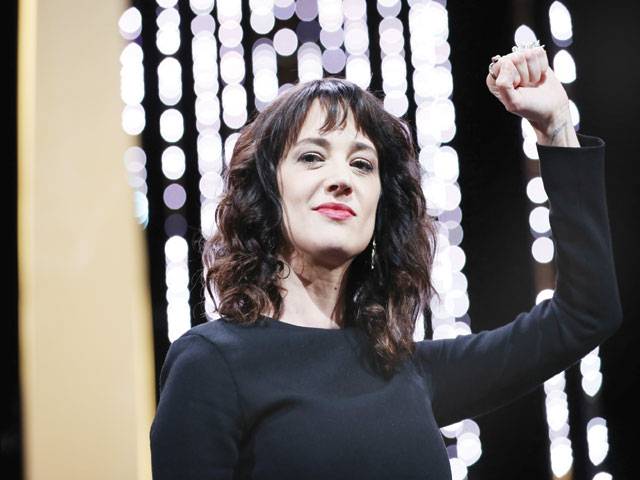CANNES-“Shoplifters”, a heartwrenching family tale by Japanese veteran director Hirokazu Kore-eda, won the Palme d’Or top prize at the Cannes film festival Saturday, at a ceremony marked by an emotional speech by a Harvey Weinstein accuser.
Accepting one of global cinema’s most coveted honours from jury president Cate Blanchett, Kore-eda said movies made him hopeful for the state of the world.
“Maybe because of cinema, the people who usually fight each other, the countries that are fighting each other, may be able to come together,” he said. Spike Lee won the runner-up Grand Prix for “BlacKkKlansman”, a searing broadside against racism with the stranger-than-fiction true story of an African-American police officer who manages to infiltrate the highest levels of the Ku Klux Klan.
Blanchett said the film, which explicitly links the 1970s tale and white nationalism in the Trump era, “blew us out of the cinema”.
Lebanese actress-director Nadine Labaki, one of three female filmmakers among the 21 contenders, earned the third-place Jury Prize for “Capernaum” set among the poorest of the poor in Beirut and featuring a devastating performance by a 13-year-old Syrian refugee boy.
It was the first edition since the Weinstein sexual assault scandal sparked the #MeToo movement.
Presenting the best actress prize, Italian star Asia Argento, who has said she was raped by the Hollywood mogul at Cannes in 1997, told the ceremony he would never be welcome at the event again.
“This festival was his hunting ground,” said Argento, who says she was 21 when Weinstein attacked her in his hotel room. “He was seated among you... But things have changed. We are not going to allow you to get away it,” she said to cheers from the audience.
Kazakhstan’s Samal Yeslyamova nabbed best actress for “Ayka” by director Sergey Dvortsevoy for her moving portrayal of a young jobless immigrant from post-Soviet Central Asia who abandons her baby in Moscow.
Polish Oscar winner Pawel Pawlikowski took the prize for best director for “Cold War”, a tragic love story set against the backdrop of the Iron Curtain.
Pawlikowski, who won the foreign-language movie Oscar for “Ida” in 2015, caused a scandal at home when he told AFP at the festival that the film had been “blacklisted” by the nationalist government. Warsaw denied the claim.
He said his award was “a rare piece of good news” for his country.
Marcello Fonte of Italy clinched best actor for his much-loved performance as a soft-spoken pooch groomer who stands up to a local heavy in Matteo Garrone’s “Dogman”.
“Three Faces” by Iran’s Jafar Pahahi, who was barred from attending the festival, shared the best screenplay prize with Italian director Alice Rohrwacher’s “Happy as Lazzaro”.
The Belgian transgender ballerina drama “Girl” won the Camera d’Or prize for best first film. It had earlier scooped the Queer Palm prize for LGBT-themed cinema and the best actor award for Victor Polster in the Un Certain Regard sidebar section. “Shoplifters” was an early favourite at the 71st Cannes festival.
It depicts a couple who rescue two abused and neglected children, providing the first love the youngsters have experienced in their lives even as they groom the kids to steal.
US movie website hailed it as “miraculous” while The Guardian called it “a rich, satisfying film” and a “complex and nuanced family drama”.
Spike Lee called his own film, which many critics hailed as a return to form for the “Do the Right Thing” director, a “wake-up call” against extremism around the world. “It’s a very, very scary time we live in,” he told reporters.
“There is a lot of change but there is a lot of stuff that needs to happen... and with the present (Trump) administration they’re doing many things to roll back the clock which I feel is dangerous.”
Beyond the prize winners, this year’s festival will linger for its off-screen moments.
Hollywood stars including Blanchett, Kristen Stewart, Helen Mirren and Salma Hayek and directors Ava DuVernay and Patty Jenkins joined a red-carpet protest to demand equal opportunities for women and a “safe workplace”.
Two days later, festival organisers signed a pledge to encourage more diversity in its selection by 2020, saying they hoped it would set an industry standard.
Despite being one of the most sought-after tickets, the premiere of Danish bad boy Lars von Trier’s “The House That Jack Built” saw audience members walk out in droves from what they called a misogynistic orgy of violence.
Both its female stars, Uma Thurman and Riley Keough, were conspicuously absent from the red carpet, where Stewart on another night staged a protest of her own by slipping off her high heels and climbing the vaunted Cannes stairs barefoot.
In 2017, the top prize went to Ruben Ostlund’s “The Square,” an art world send-up that went on to bag an Oscar nomination.
Japanese director Hirokazu Kore-Eda poses on stage with President of the Jury Cate Blanchett after he was awarded with the Palme d’Or for film Shoplifters.–AFP
JAsia Argento gestures on stage during the
closing ceremony of Cannes Film Festival.–AFP







